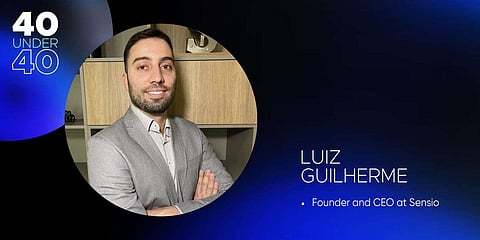

Luiz Guilherme is the founder and CEO at Sensio, in Brazil. He was raised in the manufacturing world as his father had a furniture factory. Luiz always liked being in this industry, and combined with a passion for technology, he decided to study mechatronics engineering at the University of São Paulo. After graduating, Luiz spent almost 3 years managing his father's company, where he had the opportunity to dig deeper into the challenges of manufacturing. There he felt the pains of inventory and production management, and after doing some research on tools for small and medium factories, saw a gap in the market, and decided to create Sensio. Luiz started coding the project and testing it in the factory, using the user's feedback as a guide toward the roadmap. As the MVP matured, he hired a couple of employees and started to sell to other companies. Today, Sensio has more than 150 customers and is a team of 12 people. Luiz acts as CEO and also as the technology and product leader, managing the development and data science team.
Sensio is a platform designed for helping manufacturing companies run their daily operations, by managing and optimizing inventory and production. The company integrates with the customer's ERP to get data from orders and products, and through AI it analyzes this data, runs algorithms, and optimizes inventory and production. This is done today mainly via 2 big components.
One of them is demand forecasting. Combining historical data and SKU attributes Sensio can make accurate predictions of future demand. This is done not only for sales planning on the product that the company sells but also for the raw materials that the company needs to buy. This way, purchasing, sales, and production can speak one single language and have better planning. This process is done automatically and the software the company develops can select the best model for each company, not needing to make whole new deployment and analysis of models for each new customer. The company has seen improvements of up to 18% in inventory levels reduction.
The other component Sensio acts on is its production optimization. The company knows that scheduling is a complex problem and with so many products, machines, and routings, production scheduling can become a nightmare in a manufacturing company. Being an NP-hard problem, the company approaches it from other angles. Sensio does this via simulation. Monte Carlo simulation is one of the techniques the company uses to create lots of scenarios of what can happen and to select a solution that is good enough, knowing that it probably won't get the best solution. So, through a combination of techniques, Sensio takes many factors into the model, runs the simulations, and selects a good solution, based on criteria chosen by the customer. This is tricky due to the huge amount of computational effort it can take as the number of products and machines grows, but the company is starting to see some real improvements in lead times and OTIF numbers.
Luiz says "Knowing what, when, and how many to purchase and to produce is a paramount challenge to any factory, and the company's solution makes it as smooth and efficient as possible with demand forecasting." Another demand from this industry is to schedule the production in the way that makes the most sense to the company, whether it's minimizing late orders or reducing total makespan, and Sensio's innovation can do that.
Luiz says "With Sensio's solution, its customers experienced an inventory level decrease of up to 18%, and improvements in lead time (up to 22%) and OTIF numbers."
The solution helped Sensio make customers get and see real value in its product, improving not only retention but also time to value.
Luiz explains "The biggest challenge is to automatically adapt to the reality of each customer. Making sense of what features and parameters are important for the model is difficult because it depends a lot on the nature of the company, its products, and demand patterns. We still can improve a lot in this field."
He continues "And in the production scheduling company to deal with the huge amount of data that needs to be considered in the model, because the problem is NP-hard, and we have to simulate scenarios and choose a good enough solution, as the optimal solution is impossible to determine."
Sensio is a startup that is currently under Amazon AWS Activate for Startups 'program. The company is using AWS Forecast for the demand forecast project and AWS Sagemaker for its scheduling module.
Quote: "Artificial Intelligence is just beginning its path for manufacturing and supply chain optimization. In the next years, we'll see an explosion of use cases on the factory floor, combining software and hardware to produce huge improvements."
Management: Luiz Guilherme, Founder and CEO
Website: https://www.sensio.com.br/
Join our WhatsApp Channel to get the latest news, exclusives and videos on WhatsApp
_____________
Disclaimer: Analytics Insight does not provide financial advice or guidance on cryptocurrencies and stocks. Also note that the cryptocurrencies mentioned/listed on the website could potentially be scams, i.e. designed to induce you to invest financial resources that may be lost forever and not be recoverable once investments are made. This article is provided for informational purposes and does not constitute investment advice. You are responsible for conducting your own research (DYOR) before making any investments. Read more about the financial risks involved here.
